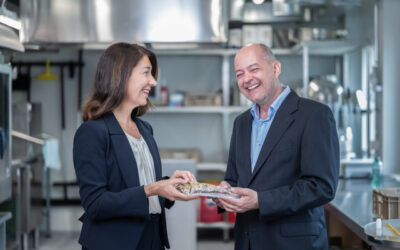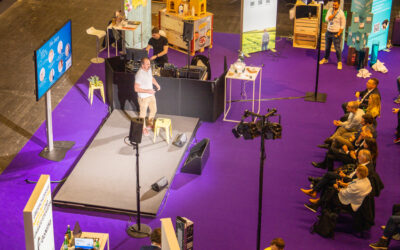EHL President Carole Ackermann joins the SFNV Steering Committee

As President of the EHL Foundation and Holding and CEO & Co-Founder Diamondscull – a company that invests in tech startups – Carole will bring unique insight into the fields of innovation, investment and academia. We recently took the opportunity to sit down with her to talk about the climate crisis, the role of the next generation and why we need to collaborate to shape the future of food.
In your opinion, what has Switzerland got to offer as a food innovation nation?
Profound research, excellent innovative food companies, great chefs to create menus, and intelligent people who don’t only care about our planet but are actually willing to take action to protect it.
Where do you see the biggest opportunities for impact?
No industry, company, institution, or country can tackle the challenges facing our food systems alone. To achieve the goals we’ve set ourselves by 2050 and secure a sustainable future, we need to play together.
What are the most significant challenges that need to be overcome?
For me, the key question is: “How can we reshape the way we live to protect the planet that we all call home?” Industry stakeholders, decision-makers, and opinion leaders need to join forces as a matter of urgency to develop concrete plans to move things forward. And, of course, substantial investments on a global scale will also be needed to make these changes happen.
How will we produce, buy and eat food in the future?
The direction we need to head in is clear. We all need to consider how to reduce the ecological footprint of our diets and rethink how and what we eat. I have justified hope that technology will help us find smart ways to nourish Earth’s growing population. But of course, we can’t forget that the very fact that the global population is growing is, in itself, contributing to the climate crisis.
What role do academic institutions and their industry partners play in shaping the future of food?
They can launch explorative, interdisciplinary research projects to develop new nutrition, packaging, farming, or waste management solutions. At EHL, as a university of applied science, we anticipate changing consumer demands and industry needs and develop innovative concepts for the hospitality industry.
How can we help young people and budding entreprensurs to develop the mindset and skills needed to reshape our food systems?
By supporting them and trusting them to try new things and experiment. Our new EHL campus, for example, was designed to be a safe space where students can think the unthinkable, speak the unspeakable, and question the obvious.
Could you tell us a bit more about one of your favourite student-led projects?
Two students from the EHL Swiss School of Tourism and Hospitality developed an ambitious sustainability-focused concept called LeftLovers that was used at the Grand Resort Bad Ragaz. Working together with the resort’s F&B Director, they set up a pop-up restaurant that served new, creative meals made from ingredients that could no longer be used in the hotel’s main restaurant. Wasting food is a total no-go for me, so I really loved this idea.
And of course, I’m always excited to hear about the latest developments in EHL’s Innovation Village, which brings together a broad range of companies to share knowledge and ideas about the future of food and hospitality industries.
Never miss a Swiss food innovation morsel.
Latest News
planetary scales B2B ingredient sales as ALDI Suisse selects Libre® mycoprotein for product launch
Planetary SA (“planetary” or the...
Yumame Foods and Le Patron partner for a delicious, plant-based future of food
Valley partner Yumame Foods and the...
What the food industry can learn from GDI’s Major Shifts model
The future is coming faster than many...
Meet the finalists of the Igeho Rising Star Award for 2025
Many startups applied. 15 made it to...




